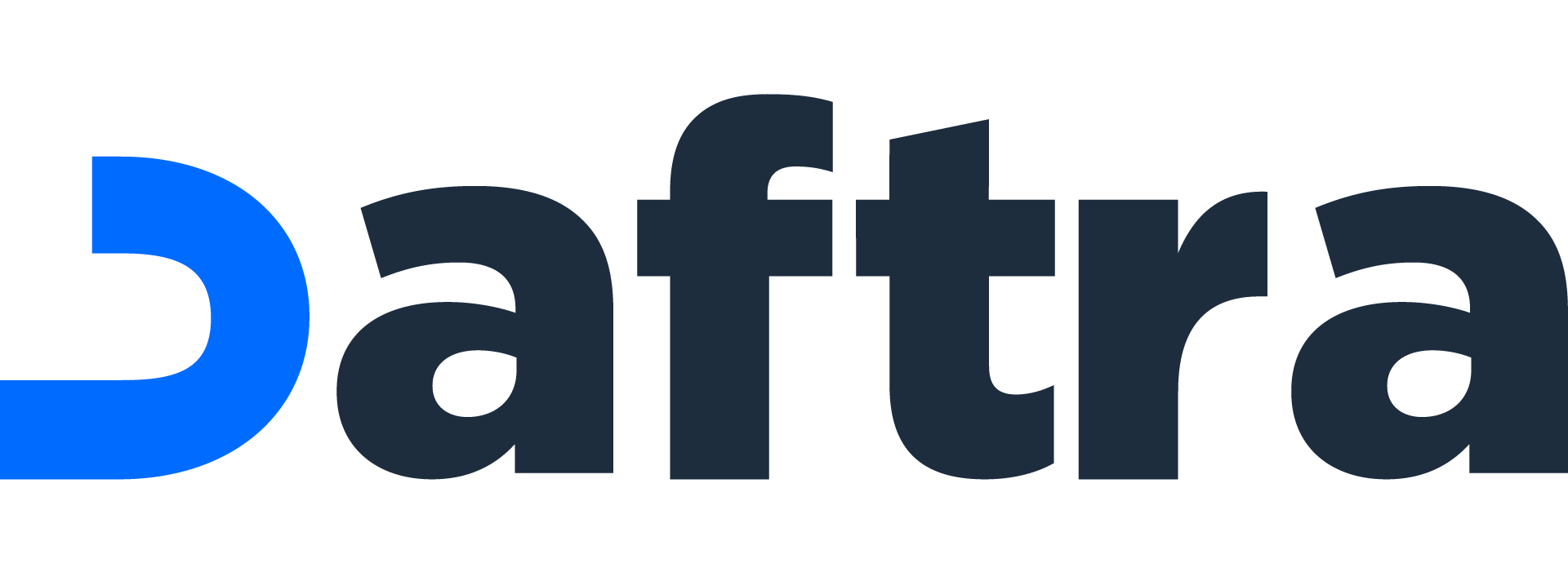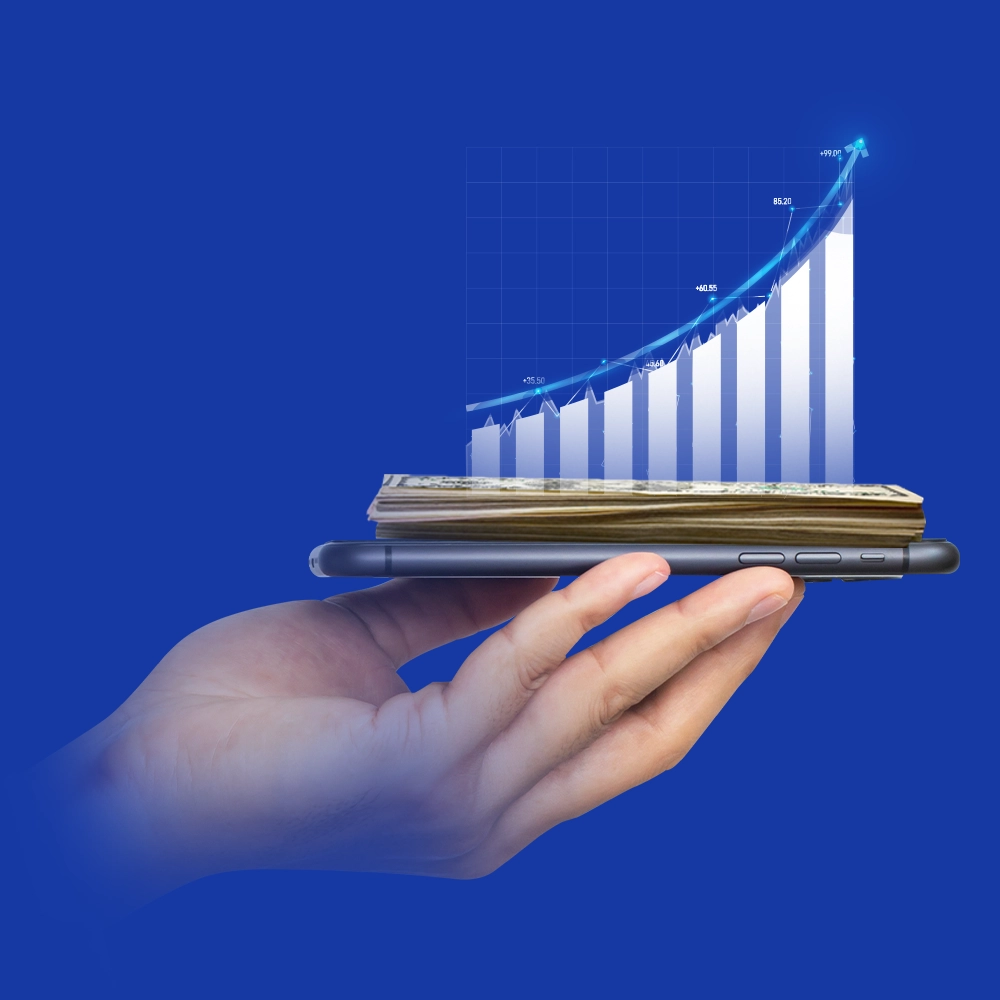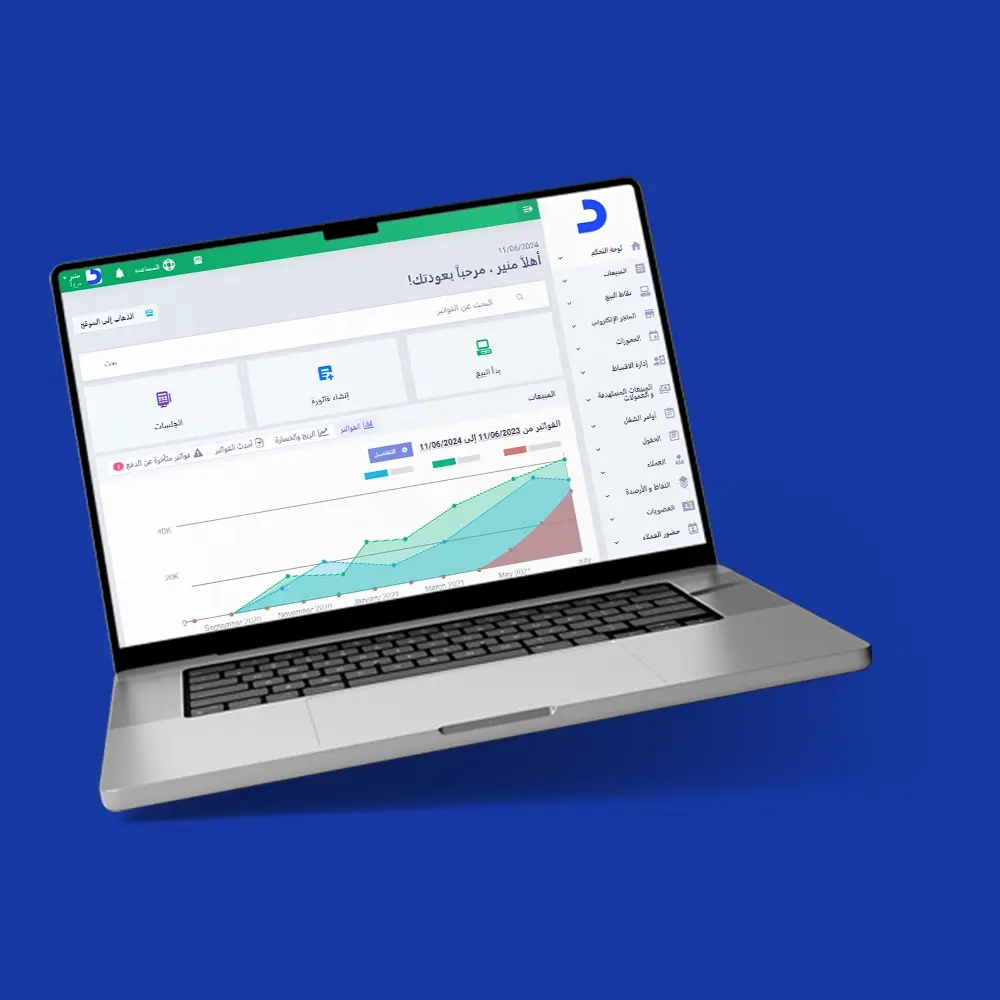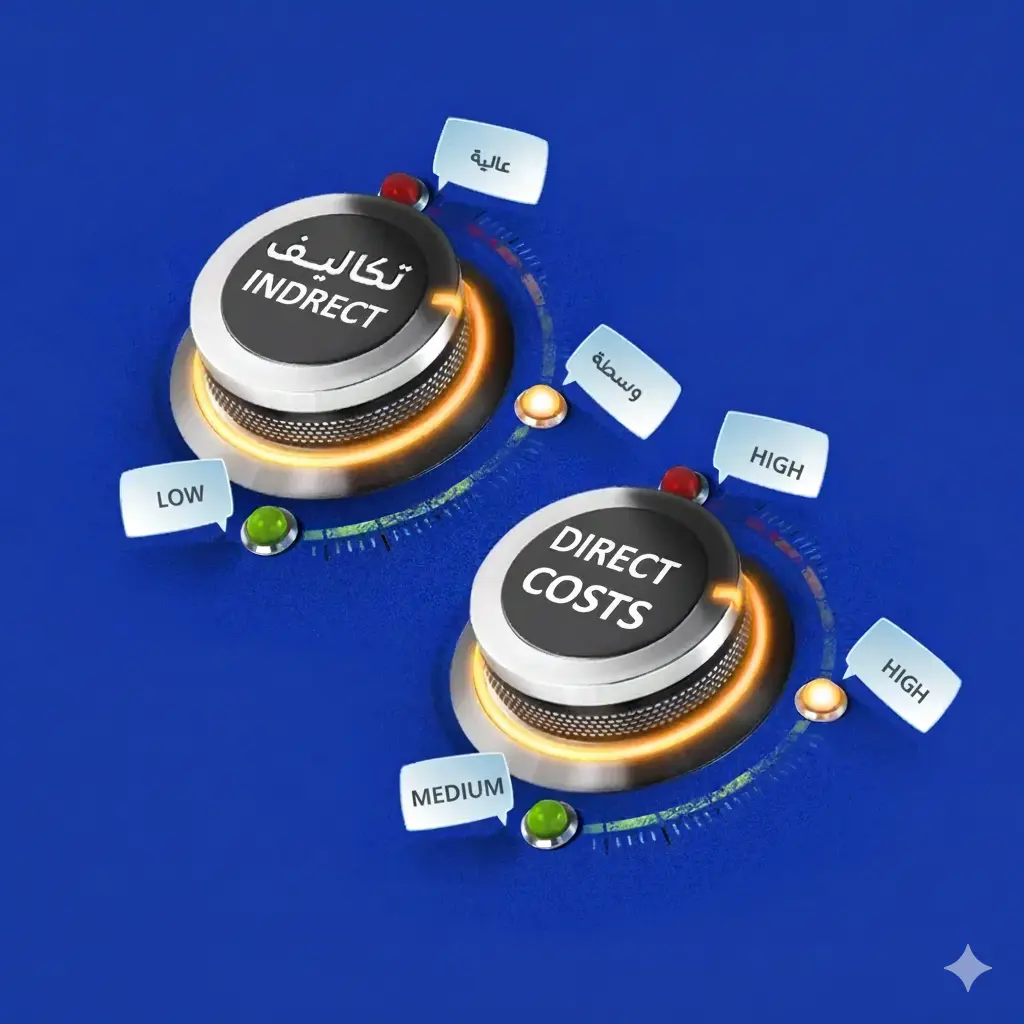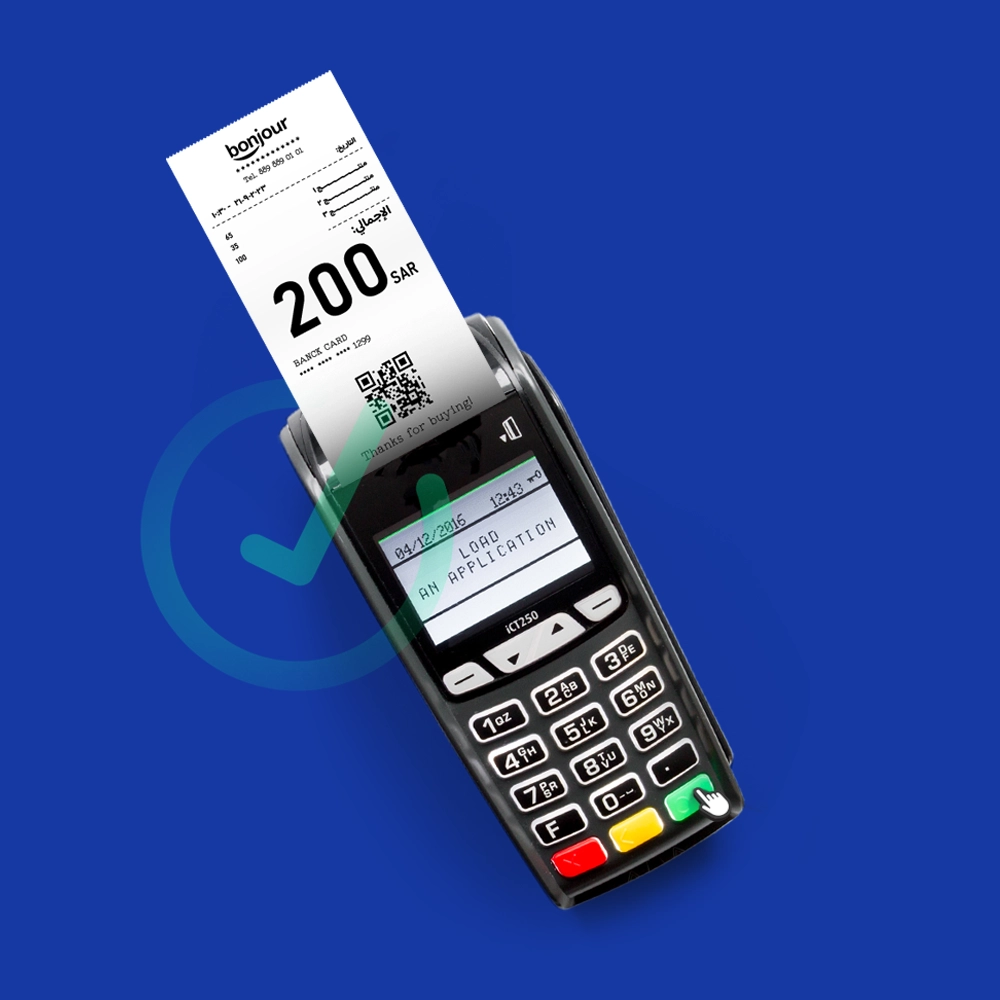Everything You Want to Know About Electronic Accounting

Table of contents:
- Summary of Key Points
- What is Electronic Accounting?
- What are the characteristics of electronic accounting?
- What are the types of electronic accounting?
- What are the objectives of electronic accounting?
- What is the relationship between electronic accounting and accounting information software?
- What are the advantages and disadvantages of electronic accounting?
- What is the difference between electronic accounting and traditional accounting?
- How does Daftra become your path to the advantages of electronic accounting?
- Frequently Asked Questions
Electronic accounting is considered a key to using accounting information software and artificial intelligence technologies in the field of computing, and completing massive accounting analyses in an integrated digital manner. It has also become a strong alternative to traditional accounting, which is characterized by many flaws and problems. However, despite all the advantages of electronic accounting, we find that it has also posed many challenges, such as facing electronic breaches, cyber attacks, and others, which necessitate that companies become familiar with all aspects of electronic accounting and learn how to benefit from its advantages and minimize its disadvantages as much as possible.
Therefore, we present in this article a comprehensive guide to electronic accounting, including its characteristics, objectives, and the most prominent advantages and disadvantages of this approach. All this and more can be found with detailed information that helps you manage your business successfully.
Summary of Key Points
- Electronic accounting is one of the types of accounting based on software and digital applications connected to the internet or offline, which aims to accomplish all accounting tasks with less time and effort, and reliable results.
- The most important characteristics of electronic accounting are its ability to learn, freedom from complexity, flexibility of data entry, and the reliability of its accounting and financial results.
- The objectives of electronic accounting are multiple, most notably creating financial reports characterized by accuracy and ease of sharing with responsible parties, eliminating the monotony of traditional (manual) accounting work, facilitating quick strategic decisions, and enabling the ability to track finances.
- Electronic accounting takes several forms, including simple spreadsheets, ready-made, non-customized commercial accounting software, cloud-based accounting software, customizable financial accounting software, and enterprise resource planning software and programs.
- Electronic accounting achieves many features and benefits, including saving money, facilitating collaboration between individuals, managing taxes easily, and achieving effective internal control.
- Electronic accounting is not without flaws, including technical errors, installation and maintenance costs, and the threat of hacking.
What is Electronic Accounting?
Electronic accounting is the practical application of using computers and modern technology in the field of accounting, eliminating the need for traditional manual accounting and accounting ledgers. Online accounting relies on the use of specialized accounting software programs to complete accounting procedures digitally.
Business management takes a long time, but electronic accounting software works to complete daily accounting tasks through online accounting software, where financial data can be added on a continuous basis, and evaluations of this financial data can be created at the appropriate time. Using computers saves time for companies and maintains good organization of financial information.
Through the previous paragraphs, you have learned what the concept of electronic accounting is, and that it simply means using accounting through modern technologies rather than traditional ones.
What are the characteristics of electronic accounting?
In a few small paragraphs, we will clarify the most important characteristics of electronic accounting, which are briefly represented in that it can be learned, is not complex, is flexible, and is reliable, as it is also available at any time and from anywhere.
We can go into more detail about the features and characteristics of electronic accounting:
1- Learnable
Accountants or workers in the accounting field can easily learn electronic accounting and become familiar with its basics without complexity or difficulty.
2- Free from complexity
Electronic accounting software is characterized by its simplicity and ease of use, allowing it to be used effectively by both company employees and specialized accountants.
3- Flexible in data entry
With electronic accounting software, accounting data and information can be entered regardless of their size and number, and information and data can be easily modified to reflect changes that occur within your company.
4- Reports with high reliability
The reports and invoices obtained through electronic accounting are characterized by high reliability because electronic accounting helps reduce calculation errors and thus increases the reliability of results.
5- Available at any time
Electronic accounting is an accounting software that can be accessed at any time you want to view the financial data and reports that have been stored and entered.
What are the types of electronic accounting?
Electronic accounting is not just one type but rather many classifications that make it comprehensive. It contains spreadsheets, financial accounting software, cloud computing software, and programs that help in enterprise resource management. Let's explain this matter in more detail. Here are the categories and types of electronic accounting and their software:
- Spreadsheets: such as Excel or Google Sheets, and others.
- Ready-to-use financial accounting software: with specific templates and entries without additional customizations.
- Customized accounting software: based on customer needs and specifications, with flexibility and the ability to modify and change them.
- Cloud computing programs and software, which rely on storing and processing data through hosting it on internet sites and web servers, such as the Daftra accounting program, which provides complete tools for accounting online.
- Enterprise Resource Planning (ERP) programs and software, which provide a comprehensive set of applications and services in one place, such as customer relationship management, accomplishing tasks related to financial accounting (invoices, taxes, reports, and financial statements, tracking expenses and revenues, and human resource management.
What are the objectives of electronic accounting?
Electronic accounting has goals that it works to achieve and reach, and these goals are represented in achieving high accuracy, eliminating boredom, improving work quality, and helping in decision-making. It also works to facilitate financial tracking and preparing invoices and budgets.
We then move on to the detailed explanation of these points, and here are the purposes and objectives of electronic accounting:
1- High accuracy financial reports
Electronic accounting aims to obtain more financial and accounting reports and data required in financial accounting with efficiency and accuracy.
2- Eliminating monotony
When using traditional manual accounting, many accountants feel monotony and boredom from performing many calculations, so electronic accounting aims to rid accountants of monotony and boredom during work and while doing accounting for their company.
3- Improving accounting work
Electronic accounting seeks to improve accounting work by eliminating traditional methods of this work and trying to keep pace with technological development so that accounting work becomes better in the future.
4- Making strict and quick decisions
Electronic accounting aims to help company officials make informed and timely decisions through quick and immediate access to reports and data related to the company's internal and external accounting, while facilitating accounting work for companies and their operations that are closely tied to controlling the company's finances.
5- The ability for financial tracking
Electronic accounting seeks to facilitate the financial tracking process for company owners, so through this type of accounting, it has become possible to simply monitor your company's money in terms of income and expenses.
6- Getting financial invoices on time
This is the basic function of the electronic accounting software, where customer data records are stored and accurate invoices are created on time, and the collection process is carried out by reminding to send invoices on time and tracking overdue payments.
7- Budget preparation and forecasting
The computer-based accounting software creates reports for different time frames, which helps track the company's work performance and prepare accordingly for the future, based on past balance sheet summaries.
What is the relationship between electronic accounting and accounting information software?
Electronic accounting software and applications use accounting information software to record and store important data and numbers, which helps in analyzing, retrieving, and accessing them easily to complete accounting operations accurately and reliably in less time and effort.
Accounting information software depends on keeping up with technological updates that integrate advanced software technologies, which contribute to easy information exchange between concerned parties, improving accounting work efficiency, and managing institutional resources and financial affairs effectively and comprehensively.
| An excellent example of this is the Daftra accounting program, which uses various technologies to provide complete account management and provide accurate reports, with recording operations that occur periodically and automatically, and many available options to meet the needs of different companies easily and simply with modern technologies. |
Thus, we have answered the question of what the link is between electronic accounting and accounting information software, which can be summarized in that electronic accounting software uses information software to complete storage operations and their numbers easily.
What are the advantages and disadvantages of electronic accounting?
Electronic accounting, like anything around us, has advantages and disadvantages. Electronic accounting, despite its many advantages, is not immune to flaws. Let us explore the advantages and disadvantages of electronic accounting in more depth.
Advantages of Electronic Accounting
Electronic accounting has many diverse advantages that help companies greatly, as it provides them with quick access to data and transactions, speed in performance, in addition to lower costs, reliable and secure operations, and it also helps in permanent data storage.
These things briefly make companies rush to use electronic accounting. Here are the advantages in detail and clearly:
1- Easy access to data and accounting transactions
The electronic accounting application helps perform daily accounting tasks such as tracking company-specific expenses, creating invoices and receipts, and sharing invoices, because the electronic accounting software helps companies stay financially organized. When information is entered into the software, data can be easily tracked and obtained faster.
2- Faster accounting
Being an accounting software based on modern electronic software, the electronic accounting program allows accounting data to be entered, processed, stored, and accessed in real time. Using the electronic accounting software saves companies time as accountants can process more data faster, which saves a lot of time that was spent reviewing accounting data, and also saves effort.
3- Saving money
The days when accounting was only done by professional accountants are gone, but with electronic accounting software, basic accounting functions can be performed without the need for a large number of accountants, which saves a lot of money. Electronic accounting also reduces the occurrence of financial deficit, which helps perform correct calculations free from errors.
4- Highly reliable accounting transactions
Electronic accounting software eliminates the possibility of human error, which is very common in manual accounting, where you can completely rely on the accurate data and reports generated by this type of accounting.
5- Facilitating collaboration
Electronic accounting software facilitates remote collaboration with certified accountants and company employees, where data synchronization with the bank that the company deals with is enabled, and financial reports can be imported in seconds when needed.
6- High security accounting transactions
Electronic accounting software is created with advanced security mechanisms to protect your company's highly confidential financial data. Supported by artificial intelligence, it maintains the security of all financial information, passwords, accounts, tax information, and so on through secure access for limited users.
7- Easy tax management
The electronic accounting software provides you with one platform where you can get a quick overview of how much tax you have paid so far. In addition to that, it also provides the amount due to be paid in taxes on each invoice, meaning that electronic accounting applies tax accounting principles.
8- Permanent data storage
Information storage is vital for businesses and companies. After entering information into the accounting software, it is stored indefinitely. Through electronic accounting, regular backups can be made on the company's financial software, which is mandatory to avoid losing any information.
9- Report preparation
Electronic accounting software allows companies to distribute financial information easily. Financial data and reports are printed directly and distributed internally and externally to those who need them electronically. Accounting transactions can also be accessed from all company departments through electronic accounting software, which gives accountants better access to financial information.
10- Effective internal control
With all the advantages of the online accounting software, business owners and companies can design their own internal control software and increase the effectiveness of this control, which is one of the most important tasks of management accounting, when they use electronic accounting.
These advantages provide companies with the ability to manage taxes and financial and accounting operations smoothly and very quickly.
Disadvantages of Electronic Accounting
Electronic accounting has some disadvantages that may worry some companies because it has some technical errors, may incur costs for maintenance and installation, and is also threatened by hacking.
Here are the details of the disadvantages and problems of electronic accounting:
1- Technical errors
Any software that operates electronically is susceptible to facing technical problems at any time, and similarly, while using electronic accounting software, many technical errors can also be encountered, such as server problems, power outages, software errors, and so on.
2- Installation and maintenance costs
Although the electronic accounting software may seem cost-effective in the long run, its adoption in the company and its maintenance can be very expensive. Initially, a lot of investment must be made to train company employees to understand and get used to automated accounting software.
3- Threat of hacking
Despite storing business accounting information securely, it can be easily hacked and misused against your company, so you must be careful while securing electronic accounting information with strong passwords and granting access to it only to the most trusted people.
4- Work disruption
When using electronic accounting, workflow can be disrupted for a period of time that may be short and sometimes may be long, which significantly affects the company's software, because electronic accounting is susceptible to technical failures.
5- Possibility of manipulation
Through using some creative accounting methods that encourage changing financial data and falsifying the truth of numbers to serve the interests of some people, financial and ethical disasters can be caused for companies.
| Many prefer using Daftra software to avoid these disadvantages, as it is completely secure for data and information inside it. There is continuous support to solve problems and technical failures quickly, which keeps your business running without interruption. This is in addition to ease of use and multiple management tools. |
What is the difference between electronic accounting and traditional accounting?
Electronic accounting and traditional accounting differ in many ways. Electronic accounting works to perform various operations automatically and records data in its own database. In addition to this, it provides backup copies to ensure data is not lost, and financial data can be obtained after recording it once a year.
As for traditional or manual accounting, all operations must be performed individually, and all details must be recorded in a daily ledger. It also takes a relatively long time to complete all operations. In addition to this, it needs to record data more than once to obtain backup copies.
There are many differences between electronic and manual accounting, and here are these differences in more depth:
Direct calculations
In electronic accounting, the program is designed to perform the necessary calculations related to financial transactions. On the other hand, in traditional manual accounting, the accountant must perform all calculations individually.
Recording
In traditional accounting, all accounting details are recorded in a daily ledger and a detailed transaction record. On the other hand, databases and accounting software are the foundation of electronic accounting.
Time
There is another important difference between traditional and electronic accounting, which is that in the former, the accountant needs to work on each transaction separately, thus spending a lot of time recording it in books and related operations. In electronic accounting, the accounting transaction is entered, updated, and completed automatically, which consumes less time.
Providing backups
The only possibility for making backups in traditional accounting is to repeat writing accounting transactions and reports, which is another difference between manual and electronic accounting. On the other hand, this process can be performed immediately in electronic accounting.
Instant financial statements
Another noticeable difference between manual and electronic accounting is that financial data is prepared once a year in automated accounting, and can be obtained instantly at any time.
Trial balance
In traditional accounting, the trial balance is prepared only when needed, while in digital electronic accounting, an instant trial balance is provided daily.
Financial certificate
In the traditional accounting software, the financial statement is prepared at the end of the fiscal year. In contrast, in the electronic accounting software, the financial statement is provided with one click of a button.
How does Daftra become your path to the advantages of electronic accounting?
There are many objectives and advantages for implementing electronic accounting software and transitioning from paper ledgers and simpler software like Excel spreadsheets. Daftra achieves all of them for you and puts you in a position of leadership and excellence. Through the accounting program from Daftra, you will join the electronic invoicing software in an accredited manner, with expert hands helping you during the transformation journey.
Daftra provides you with the best variety of reports you can obtain in the fastest time and without significant effort. The software also helps you improve the quality of your accounting work as a whole, the speed and efficiency of decisions, financial tracking, and budget preparation, with high forecasting ability.
In conclusion
Growing businesses today need to adapt to a world moving toward the digital age, which includes digitizing every aspect of business. Therefore, many companies have turned to using electronic accounting software that has helped facilitate many accounting transactions that used to take a lot of time and effort. If you want to complete your company's financial transactions in the fastest time and with minimal effort, do not hesitate to try electronic accounting.
Frequently Asked Questions
What is an electronic accounting course?
An electronic accounting course is an integrated educational software program that seeks to qualify individuals to master the electronic accounting software and learn various accounting techniques, accounting operations, and all information about accounting software and how to deal with it correctly. It also makes them qualified to enter the job market professionally.
What is the difference between electronic accounting and accounting in Excel?
- Electronic accounting is an integrated accounting software with tools and techniques that serve accounting, facilitate it, and make it more accurate. Accounting software manages accounting operations such as invoices, entries, and finances.
- Electronic accounting provides ready-made templates and is integrated with many other tools, and is also connected to banks for easy completion of financial operations. Electronic accounting may require a monthly or annual subscription, but it includes many services that make accounting work easier.
- Accounting Excel is a general accounting tool that depends on the settings made by the user and does not provide ready-made accounting templates, but rather templates that the user implements and needs some time to do all the settings needed to create their own accounting model.
- Accounting Excel is not integrated with other tools and banks, so it is difficult to complete various operations easily.
What is an electronic accounting information software?
Accounting information software is an integrated software for storing, processing, and managing various data completely and helping in decision-making, in addition to maintaining accounting and financial data.
What is meant by the American method in electronic accounting?
The American method is keeping one ledger as both a journal and a general ledger at the same time, so it is a journal page and next to it is a general ledger page, and each classification has two columns for recording debit and credit.
What are the most popular accounting software programs in Saudi Arabia?
Daftra is considered one of the most popular and widely used accounting software programs in Saudi Arabia because it provides many accounting tools that help complete operations easily. It helps with issuing invoices, managing finances and taxes, and recording all operations that occur periodically and automatically to save time and effort, in addition to providing complete security for all your data and financial operations.
What are ready-made accounting software programs?
They are applications that work to make accounting operations and their management easier by providing various technologies that give you the ability to issue invoices, prepare financial reports, and many other electronic facilities.
Can accounting be learned from the internet?
Yes, you can learn accounting from the internet through various training courses available for free or paid until you reach mastery and get all the information you need.
What is electronic accounting disclosure?
Electronic accounting disclosure is the publication of accounting and financial data and information related to the company on the internet, and this may be beneficial in gaining the trust of investors.
